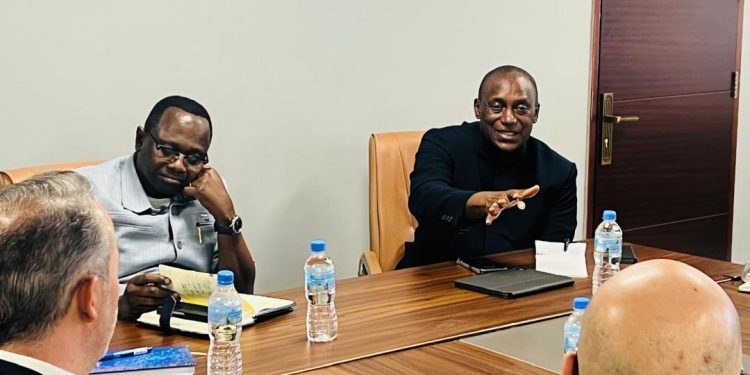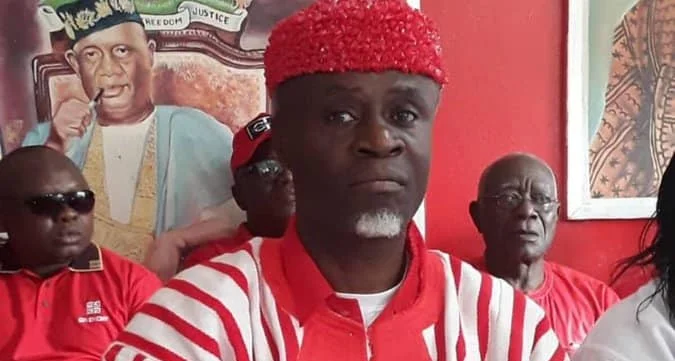By Hassan Osman Kargbo
Sierra Leone is set to pay $90 million to the controversial Karpowership between January and June this year, as the country continues to grapple with energy challenges.
Alhaji Dr. Kandeh Kolleh Yumkella, the Chairman of the Energy Governance Coordination Group in Sierra Leone, disclosed the staggering figure in an interview with AYV’s Wake Up Sierra Leone program today, revealing that by the end of the contract, the country will have paid over $300 million to the Turkish company providing floating power.
The news of the payment comes at a time when Sierra Leone’s energy crisis is pushing the government to explore long-term solutions. Dr. Yumkella explained that while Karpowership’s floating power plants have provided a temporary energy fix, the cost of doing so is a significant burden on the country’s finances. As the government continues to rely on emergency power solutions, it faces the tough task of balancing the immediate need for electricity with the long-term economic impact.
“The government has made it clear that we must break the circle of emergency power. It’s a vicious cycle,” said Dr. Yumkella. “Paying Karpowership $90 million in just six months is not sustainable. By the time we conclude the contract, we will have spent over $300 million on this emergency solution, which is far too much for a country like ours to bear.”
For many Sierra Leoneans, the energy crisis is a daily struggle. Frequent blackouts disrupt businesses, schools, and households, making it difficult for the population to go about their everyday lives. Small businesses, in particular, have been hit hard by the high cost of generators and fuel, with some being forced to close temporarily due to power outages. For these entrepreneurs, the energy issues are not just an inconvenience; they are a threat to their livelihoods.
In light of this, President Dr. Julius Maada Bio is committed to solving the nation’s energy woes. Dr. Yumkella, who is closely working with the President on the energy sector, outlined the government’s plan to invest in more sustainable and reliable power sources. One of the key initiatives is the repair and restoration of the Kingtom and Black Hall Road power plants.
“We have been working hard to repair our own generators at Kingtom and Black Hall Road. I promised the people of Sierra Leone that we would try to get Kingtom to start producing power by January, and indeed, with the help of the Japanese, we have successfully repaired the two generators,” said Dr. Yumkella. “We are now providing fuel, and we are set to begin pumping in 10 megawatts of electricity. This will be a welcome relief to the people of Sierra Leone.”
The restoration of Kingtom and Black Hall Road plants is expected to help ease the power shortages in the short term, reducing the country’s dependency on Karpowership. The new capacity will contribute to a more stable energy supply, although the government’s efforts are still in their infancy, and there is much more work to be done to ensure long-term energy security.
For Sierra Leoneans, the energy situation is not just a technical issue but a deeply personal one. Many families endure sweltering heat or cold due to inconsistent power supply, and countless businesses suffer financial strain from relying on expensive, polluting diesel generators. It is a daily reminder of the importance of finding lasting solutions to energy poverty.
Dr. Yumkella emphasized that, although the country is in a difficult situation, the government’s plans to fix the energy sector offer hope. He acknowledged the difficulty of relying on emergency power contracts like the one with Karpowership, but he expressed optimism that with continued investment and repairs to national power plants, Sierra Leone could eventually achieve a more reliable and sustainable energy system.
“We are working with the Japanese and other partners to ensure that our energy future is brighter. We must invest in the right infrastructure now, so future generations do not face the same energy struggles we are confronting today,” he said.
As Sierra Leone continues to confront the financial strain of paying Karpowership, there is a clear sense of urgency to break free from the cycle of emergency power. With determined leadership and a commitment to long-term solutions, Sierra Leone hopes to turn the corner and provide reliable electricity for its citizens, paving the way for greater economic and social development.













